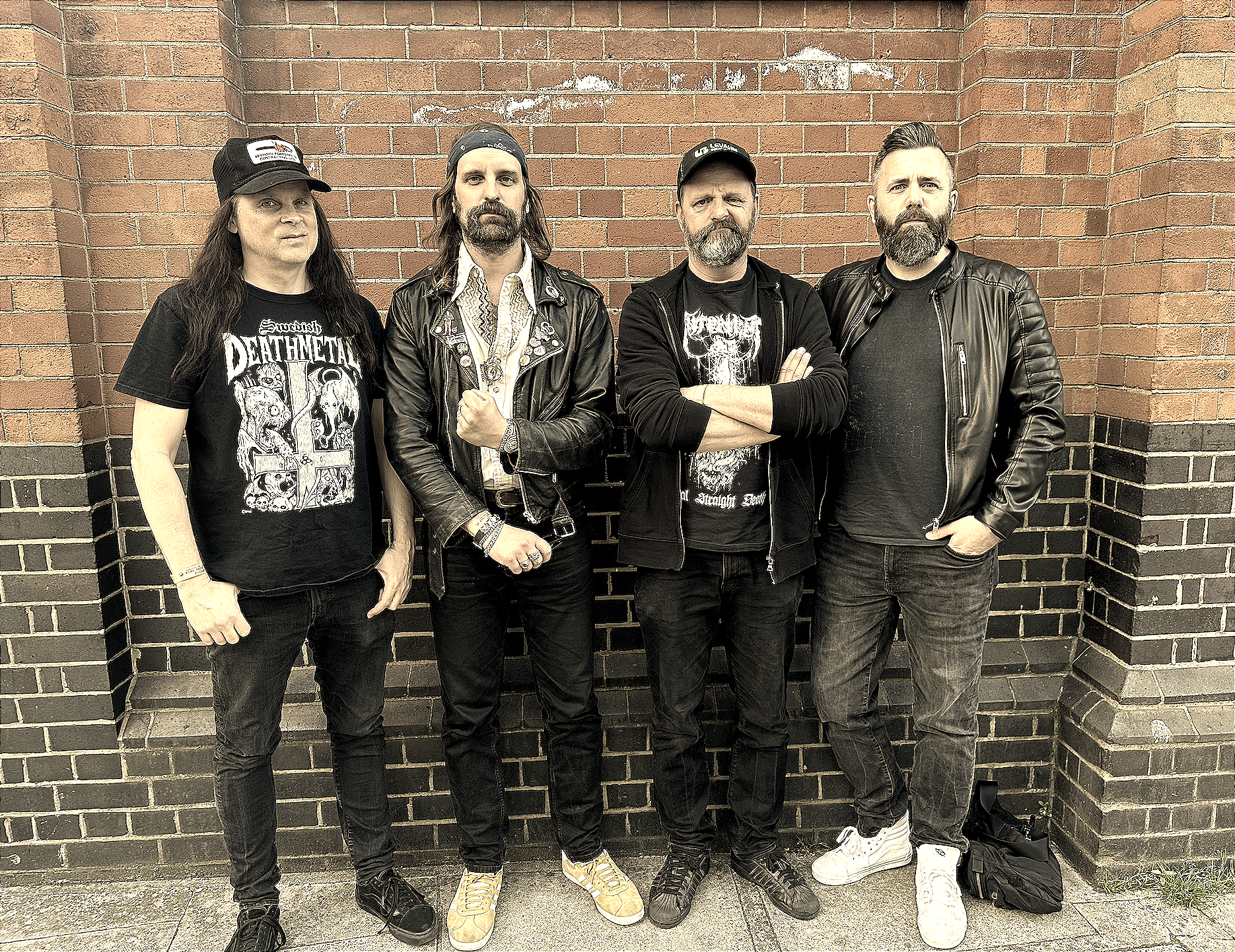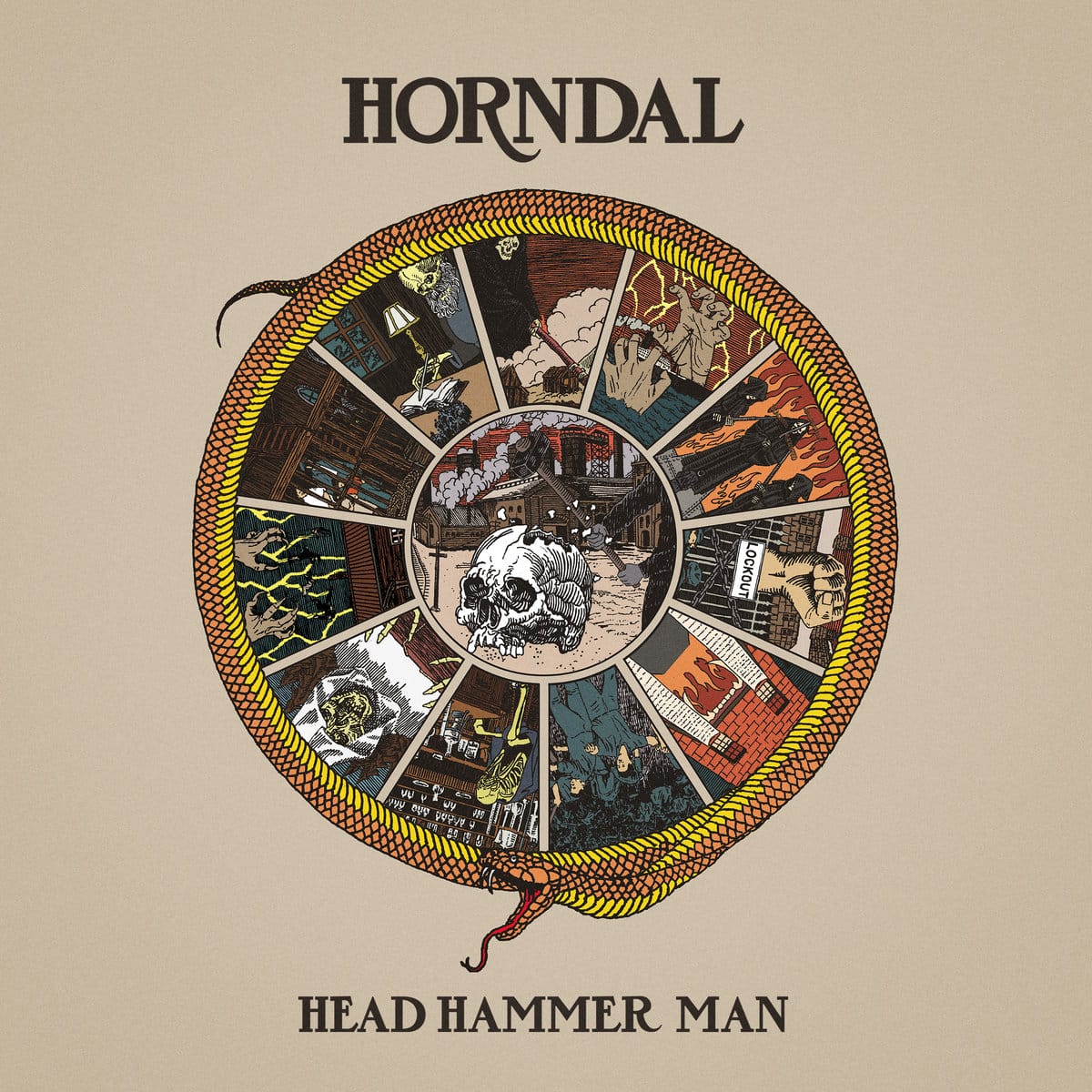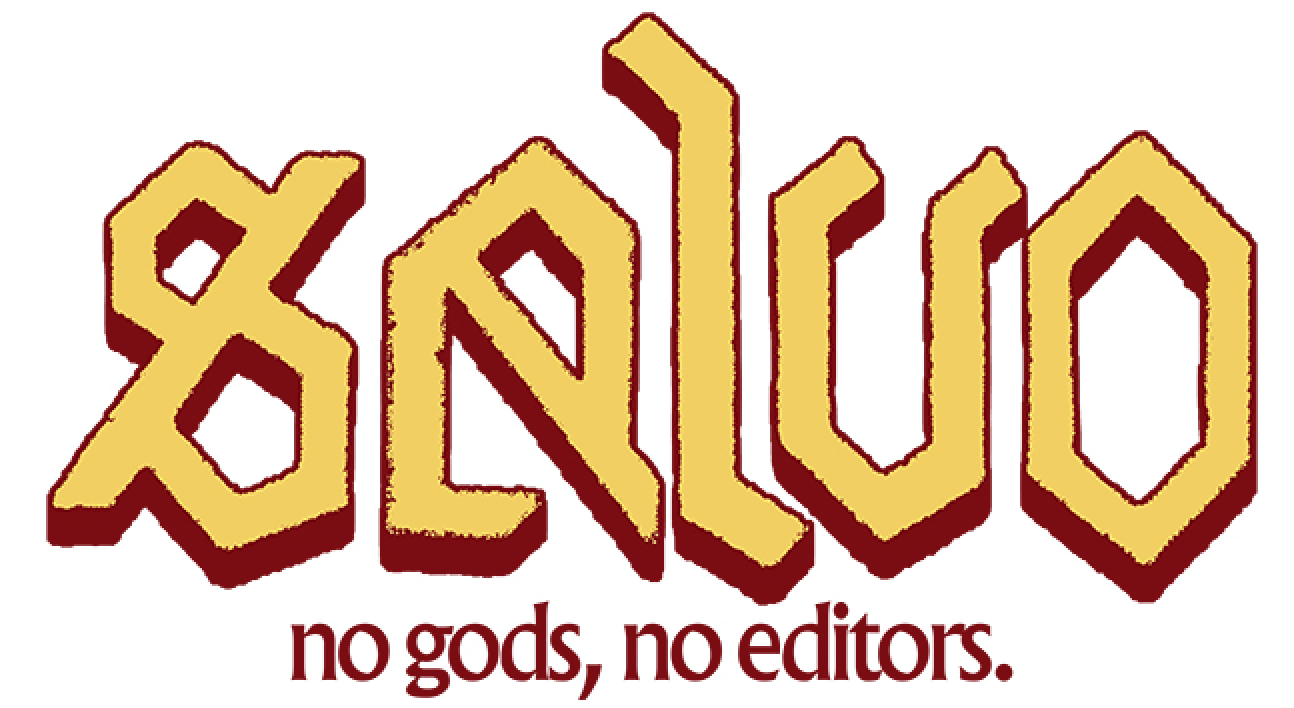Horndal's New Album is the Heaviest Swedish Labor History Lesson Ever
On 'Head Hammer Man,' the Swedish sludge troupe show that truth is uglier than fiction. "You don't have to sing about dragons and Satan. It's even grimmer in the real world."

The global labor movement is currently in a new era of terrific energy, militancy, and ambition, and covering it for my day job as a labor reporter at In These Times is endlessly exciting. I've gotten to meet union folk from all around the world and across the U.S. and while we often have plenty of other things in common, it's always an especial treat to meet a fellow metalhead in the labor space. There's more crossover between the two scenes than one might expect (and I know it's silly to refer to the centuries-old struggle to build working class power a "scene," but bear with me... it's been a long weekend).
There are tons of grown-up punks working as union staffers, I know for a fact that there are a lot of coal miners out there who love nu-metal, and a not-insignificant number of labor folks have recommended Panopticon's Kentucky album to me, which gives me a great excuse to flex (I did all the PR for it when it came out!). That's just a few examples, too; the Venn diagram between union members and metalheads is truly massive, and it makes sense given the genre's working class, industrial roots and long-held disdain for authority and the status quo.
I could continue writing a very, very long essay on those intersections, but instead, I'm going to tell you about one specific band who have embraced labor in a big way on their latest album. Horndal are a Swedish quartet whose sludgy, muscular tunes brings to mind a younger Crowbar or early Mastodon with a dash of Voivod and a smidgen of classic '90s death (which makes sense given that their new bassist, author and lifer Daniel Ekeroth, literally wrote the book on the genre).
I've had my eye on Horndal for a few years, and now just because I have a soft spot for sludge. The concept for the band revolves around the members' hometown, Horndal, a former steel town two hours outside Stockholm. The grim, post-industrial picture they pain will ring familiar to anyone familiar with the U.S.'s own forgotten Rust Belt region, as will the looming specter of evil tech titans looking to swoop in and take over that appears later on in their discography.
Their first LP, Remains, dug into that rusty history with songs like "Factory Shutdown" and "Rotting Town," while 2021's Lake Drinker delved into the area's efforts to resist Google's plan to build a new data server center in the Horndal woodlands. "They haven't done it yet, but they have deforested the land, and their plan was to use our big lake as cooling for their servers," vocalist and guitarist Henrik Levahn told me. "It was kind of a new devil in town."
Now, on their latest release, Head Hammer Man, they go full labor nerd, and tell the story of a forgotten local labor leader, Alrik Andersson, and Sweden's 1909 general strike. Henrik even wrote an entire book about it, which is available in Swedish and English and was endorsed by Sweden's biggest trade union. They even tracked down Andersson's granddaughter, and got her to guest on "Exiled." (They also snuck in a guest appearance from Henrik Palm, and sampled Andersson himself!).
Andersson's story is fascinating enough on its own, but to hear it filtered through a metric ton of distortion makes it all the more compelling (to me, at least, and probably to you, if you're reading this!). I especially enjoy the song "Fuck the Scabs," which is pegged to that 1909 labor conflict but is really just an excellent rule of thumb no matter what era you're living through.
This past weekend, I caught up with Hendrik and his drummer brother, Pontus, before their Desertfest set in an alley outside the Dev, an iconically raggedy metal bar in the heart of Camden. Our conversation has been lightly edited and condensed (there was also lot of laughter; I just think writing [he laughed] looks dumb).

SALVO: So, what are you doing here in London?
HENRIK: Yeah, we're gonna play Desertfest. It's gonna be fantastic. Very long trip. Very expensive gig for us, the money's not that good, but it's fantastic to be here, and the Dev seems to be a cool place.
Where do you guys live now?
HENRIK: Stockholm. But me and my brother, we were born and raised in Horndal. I left when I was 18, because there were no jobs, and if you wanted to study, you had to go somewhere else. And I kind of never wanted to go back. But it grew on me when I got older. Half a year ago, we bought a house 10 minutes south of Horndal. We don't live there but we spent a lot of time there. And even though this little town is kind of a ghost town nowadays, there's still some people that I know, and the roots get more important the older you get.
So tell me the story behind this new album. How did you get interested in Alrik Andersson? Was it just a piece of local history?
HENRIK: I was in blind panic! We had to do another story from Horndal, and you know, they're kind of rare; it's a small town. But all of a sudden, a local historian gave me this paper that was written 40 years ago at the University of Uppsala in Sweden, about the immigration from Horndal. And there in one sentence, he mentioned that the boss of the union in Horndal was forced into exile because he was harassed and he was blacklisted. That was so interesting, so I started to dig into archives for like two years. I found this story about this man who was totally forgotten in Hordal, in Sweden, and everywhere. It's only his granddaughter who is 76 years old and living in Los Angeles who cherishes his memory.
I started an Ancestry account for his family, and I found his granddaughter, Holly Stacho, and she knew everything about her relatives in America. But it came up that he didn't tell anyone why he came to America. He kind of closed the door on Horndal, so she didn't know anything about why he came. So then I started to write the lyrics for the record. That was kind of the purpose. But like Pontus said, you don't like a lot of words in music.
PONTUS: I mean, Henrik is my big brother, so we tend to argue about stuff a little bit. But, yeah, the amount of words is one thing. And since I write the music, I sort of have an idea how the vocals should be, and I don't want it to be too wordy, but that's a problem with having a big brother who writes books! So I said, make this a book project, please!. And we'll keep the song lyrics to a minimum. And I think that's worked really well.
HENRIK: Like the old people from Horndal, they'll say you're putting so much work into these lyrics, and no one can hear what you're singing. Yeah, that's kind of the reality of it.
Are you a writer, besides being a lyricist? Writing a book is no joke.
HENRIK: No, it's not a joke! But I'm a writer at work, I write for some companies, like a copywriter. I'm a Swedish teacher as well. I don't see myself as an author or a writer, but I just had to do it, because no one knew about him. I was kind of the only person in the world that knew the whole story. Even people in Horndal didn't know it.
So what did this 76-year-old Swedish-American woman think when this Swedish metal band reached out and said, ‘Hi, we want to write a record about your dead relative’?
PONTUS: She thought it was a scam!
HENRIK: Yeah, she told me that when she got that email, her husband said, ‘Don't answer it because it's probably a scam.’ This is a weird man super interested in your grandfather. But she said, fuck it, and she answered.
When we had the book release and the record release, she came to Sweden with her husband and that was so touching. They were in Sweden for like five days, and we had one day in Horndal so I could show her all the places in the book, like where the mill was. You know, tthis [strike] was on the verge of a civil war, because the boss started to evict all the unionized workers. People came to protest, and the military came, and shots were fired.
This sounds like a Swedish version of the Battle of Blair Mountain!
HENRIK: Yeah, exactly, like you told it in your own book. Miners from another town came with dynamite. They didn't use it, but it was super dangerous. And so I could show her, this was the place where the military was, here is the place where he worked. It was a very touching moment. We stood there crying.
Aw! And this book was actually sponsored by Sweden’s largest labor union, IF Metall, right?
HENRIK: Yeah, and one funny thing about that - this book came out at the same time that we have a union conflict with Tesla in Sweden. You know, we have no strikes in Sweden, because they came to an agreement in 1935; the unions and the bosses and the companies. It’s a system called collective deals. We meet up once a year, and we do the deals and then we continue. So there’s been actually almost no strikes since then; except sometimes when the going gets tough. And now the going has gotten tougher in Sweden because Elon Musk don't want to sign these collective deals. He don't want to be a part of that, because, ‘I'm Elon Musk.’
So now, there's a strike on their mechanics. They flew in 41 scabs to Sweden from other places in Europe. And we have a song—because there were scabs during these times as well—called, “Fuck the Scabs.” We’re going to play it tonight. We offered IF Metall and the strike guards to come and play the song outside Tesla, but they didn't want it!
I love that, and it just goes to show that everything happening now is connected to what happened before. So, tell me more about your head hammer man.
HENRIK: He worked at the steel mill, and Holly told me that that was his working title. This is too metal! It had to be that title. Very early on, we knew the record was going to be called Head Hammer Man. It's a story about him not wanting to be the union leader, but he had to be, and just six months after he got the job, a big general strike happened in Sweden. Everybody was striking in 1909, so he kind of ended up in this shit for his fellow members. And for that he got blacklisted, unfortunately. And then he came to the U.S. and ended up in Chicago and lived on until he was 90. He died in 1970, the year I was born.
Oh wow,, so he saw everything. Chicago was such a hot spot for the labor movement during those years.
HENRIK: Yeah, but he didn't take active part in the union. He was a member, he got to the meetings, but no active roles, because I guess he was afraid of being blacklisted again. But he was a union man. He saw everything in black and white.
In the U.S. labor tradition, every kind of person has been involved, particularly immigrant workers, but I don’t actually know much about how the Swedes fit into that history besides the most famous one—Joe Hill.
HENRIK: Yes, Joe Hill! Horndal is one hour south of where he comes from, Gävle; it's quite close.
Did you learn anything else about the Swedish community in Chicago at that time while you were looking into this?
HENRIK: Chicago was the second biggest town in Sweden. There were more Swedes in Chicago than Gothenburg at that time! But in Sweden, there is a very famous author who wrote these books about the immigrants that went to Minnesota to become farmers. That was like 50 years before this. In Sweden, we think that every Swede that went to America became farmers. But the biggest part of the immigration was the guys like him. So that is important for me to let Swedes know.
PONTUS: I think another big reason for that is that the songwriter from ABBA made a musical based on that story, where people from a part of Sweden went to Minnesota to become farmers. It’s a really touching story, and the musical became huge. I think nowadays, mainly the musical is a reason why people think immigration was all about people from southern Sweden, and that they went to Minnesota, period. So this story is pretty untold.
The Swedish media has really picked up on this story. We thought, it was an old story, it's a book, it’s pretty slow, compared to the previous record, which was about a subject that was really a news story on what happens when American tech wants to establish themselves in the rural parts of Sweden. But they've really picked up on this story, too, so I think the story is sort of growing.
HENRIK: Yeah, it is fun. But, you know, our family, we were like the immigrants that became farmers. You see here? LeVahn Bros? It's a plumbing company in Maple Grove, Minnesota, where our relatives emigrated. And so we came in contact with them and shared the merch.
PONTUS: Now they do plumbing in Horndal merch, and we play metal in LeVahn Bros merch!
Phenomenal. You know, I get a lot of emails about bands, and when I got one about Head Hammer Man, I just thought, ‘This is ridiculous, it’s like they made it for me’.
HENRIK: That’s what we thought when we heard about you. We should do a tour together!
I do book tours! But I always wonder if people outside of America care about American history.
HENRIK: Sweden cares so much about America. A little bit too much, I think.
But we're terrible!
PONTUS: We’re interested in that, too!
It's a mess, but at least we invented rock'n'roll.
HENRIK: Yeah, and you got Agent Orange, because Andersson’s youngest son, who was born in America, the only one they could afford sending to university, became a chemist, and invented Agent Orange.
Holy shit.
PONTUS: We have a song called “Orange Legacy.” It’s sort of a bitter thing to survive the whole big strike, to survive coming to America, and then your youngest son invents the most dangerous, more awful thing.
That's very grim.
HENRIK: You don't have to sing about dragons and Satan. It's even grimmer in the real world.
Yes! That's why I'm so interested in bands that write about that and direct their hatred towards, say, the multinational corporations choking everyone out instead of other people.
PONTUS: It’s more common in Sweden to have bands with a lot of political content in the punk and hardcore scenes, but not as common in metal.
HENRIK: You know, we have the alt-right in Sweden nowadays, and the alt-right loves metal. They love Sabaton—I hate them, but the alt-right loves them, and the leader of the alt-right party, that’s his favorite band. I do think some of our fans are alt-right guys. The story of a town that had been left for dead—you don't have to be right or left to think that it's a bad thing. It’s the analysis of it that matters.
The difference is in how they answer the question, ‘Why did that happen and who do we blame for it?
PONTUS: It’s been surprising to see because I think we expected a lot more people to be like, ‘Fuck you, you communist band!’ But it's been very well received, and I think most of our fans sympathize with our views. Some don't, but I think they appreciate the record and appreciate the story, because some of them can say, ‘Okay, my everyday political views doesn't necessarily have to be about the music I listen to.’ And some are like, ‘Okay, that's it, I'm off the train.’
HENRIK: Good, fuck off!
It's interesting to hear that, because so often it’s the lefty fans who are told to just suck it up and ignore the lyrics from bands with shitty views. You’ll find a new band that sounds awesome, then you read the lyrics and go, ‘Ahh, shit.’ It's funny to think about right-wingers doing that and going, ‘Ah, crap, I gotta care about the world now.’
HENRIK: That's the good thing with growling. They can’t hear what I'm saying!
PONTUS: For us, it has never been about being a very upfront, in-your-face, political band. It's not about that. I do think that the stories we’re telling, it's sort of growing into the battle more and more. So people can choose to see that, ‘Okay, this is a great story. I understand the historical view on it. But I don't take it as someone telling me what to think, so I can enjoy them anyway.’ I think that's fine.
HENRIK: We've been asked to play first of May demonstrations, and we said no—because the first of May demonstrations in Sweden are in the middle of daylight, and the demonstrators are like, 60-70 years old! You can imagine how bad it could be!
That sounds so cute though.
PONTUS: And we got a lot of those cute questions and requests from our hometown, I think is important that we remember that, fuck, we are a heavy metal band!
So you don't want to go play at the ribbon-cutting for the new youth center?
PONTUS: No one would like that! They don't know what they're asking. It's like, oh, they’re telling the story of their hometown, Horndal. Yeah, but we're doing it in a terrible way!
HENRIK: We had this phone call from the mayor and she said, ‘Hey, Henrik, as you know, we have this walk of fame in the middle of the town, and now we're going to announce the new name.’ And I am listening, I’m listening!. ‘Yeah, it's gonna be a professional archer. Do you want to come and play?’ No, we don't want to, in the middle of the day like with families and balloons!
You may have nice politics and be nice people, but you're not a nice band.
HENRIK: No, we're not!
At least now you're in the correct context in a grimy dive bar in London, where you’re about to go yell about how much you hate scabs and Elon Musk.
PONTUS: Fuck him!
+
Head Hammer Man is now available from Prosthetic Records—grab your copy here, and subscribe to Salvo for more labor-tinged metal coverage!

